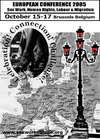Susie Bright’s Journal, 9 October 2007
Sex at the Margins with Laura Agustín
For quite some time, we’ve heard about the sex slaves— the traffickers, the sexual bondage emerging at the border. The discovery makes free citizens sick; we feel like we must to do anything to make it stop, to uncover the beast.
But something very weird has been happening. Last month in the Washington Post, a shocking story appeared: Human Trafficking Evokes Outrage, Little Evidence: U.S. Estimates Thousands of Victims, But Efforts to Find Them Fall Short.
What?
It turns out nearly 30 million dollars was spent, in a passionate effort, to find a relative tiny number of victims. The “experts” had estimated over 50,000 sex slaves, then up to a million, and warned of a tidal wave on the horizon. Yet over ten years, and aggressive funding, the activists on the ground found closer to a thousand undocumented workers who matched the description of who they were looking for.
Of course, even one person found in bondage is more than enough. But the politics and polemics of rescue seemed strangely out of whack. Other reporters had raised a red flag years before: see Debbie Nathan’s “Oversexed,” and Daniel Radosh’s critique of “Bad Trade.”
When well-intended social workers and enforcement agents sought out female migrant workers with grievances, they often found people who said, “I’m desperate for papers, but I’m not doing sex work— I’m in a different sort of bondage!”
Or, they found migrants who said, “I am doing sex work, but I’m making it worth my while, and the one way you could help me is by either getting out of my way or getting me legal documents so I make my own decision.” Or, they found male prostitutes who didn’t fit the feminine portrait of victimization at all, and they weren’t eligible for “help,” either. The problem as conceived by the policy makers was completely mismatched with the reality.
Author Laura Agustín has written a new book, Sex at the Margins: Migration, Labor Markets and the Rescue Industry, which rethinks the arguments of this entire tableau. If you’ve EVER read a story about trafficking, “immigration problems,” and felt like you didn’t know where to turn, this book will turn every assumption you might have on its head. Continue reading →
Like this:
Like Loading...
 The European Conference on Sex Work, Human Rights, Labour and Migration was held 15- 17 October 2005 in Brussels. I was a member of the Organising Committee, which began meeting in January 2004 in Amsterdam, usually at the headquarters of Mama Cash.
The European Conference on Sex Work, Human Rights, Labour and Migration was held 15- 17 October 2005 in Brussels. I was a member of the Organising Committee, which began meeting in January 2004 in Amsterdam, usually at the headquarters of Mama Cash. 

